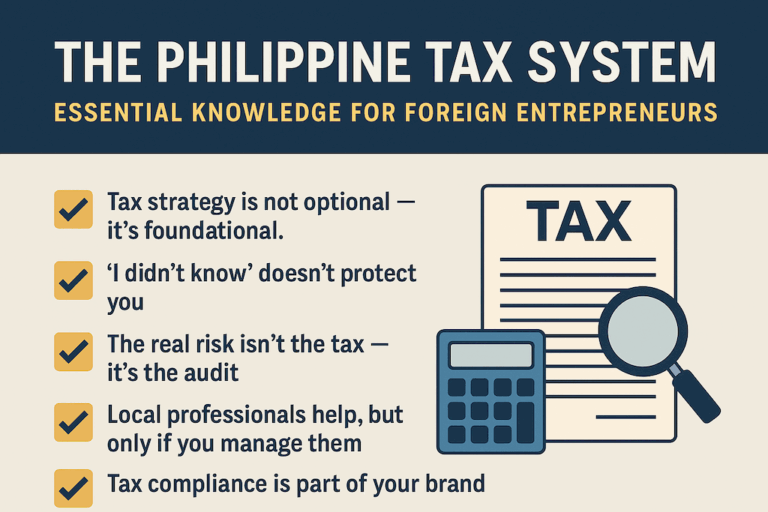Common Startup Mistakes Foreign Entrepreneurs Make in the Philippines
🇵🇭 Common Startup Mistakes Foreign Entrepreneurs Make in the Philippines
~ Pitfalls that go beyond business: Legal, cultural, and human complexities in the Philippines ~
✅ Introduction: Why Foreign Entrepreneurs Often Struggle in the Philippines
With its affordable cost of living, English-speaking environment, and diverse business opportunities, the Philippines may seem like an easy place to start a business. But many foreign entrepreneurs underestimate the complexity of local laws, culture, and human dynamics — often resulting in failure, financial losses, or abrupt exits.
This article highlights 5 of the most common mistakes foreign business owners make and offers insights on how to avoid them based on real-world experience.
❌ Mistake 1: Choosing a Nominee Based on “Trust”
~ “He’s a nice guy” is not a legal strategy ~
📌 Real Scenario:
You meet a local friend, partner, or referral in Cebu and decide to register your company under their name, believing “they seem trustworthy.” No proper contract, no legal backing — just a handshake and good faith.
📉 What Could Go Wrong:
-
Your nominee claims full ownership once the business becomes profitable
-
You’re locked out of the company, bank account, or licenses
-
Their personal issues — family problems, debts — start affecting the business
-
The nominee’s liabilities tarnish your brand’s reputation
🛡 The Hard Truth: Philippine law is designed to protect Filipinos, not foreigners.
No matter how much capital you’ve contributed or how involved you are in daily operations, if the company is legally registered under someone else’s name, it’s not your company in the eyes of the law.
Even if betrayed, you’ll likely have no legal recourse — and in court, you’ll be at a disadvantage.
🎯 How to Avoid It:
-
Sign a detailed MOA (Memorandum of Agreement) that covers investment terms, profit sharing, ownership rights, and exit conditions
-
Ensure all contracts are notarized by a licensed attorney to hold up in court
-
Don’t rely on personality — build a risk-proof legal framework
-
Involve third-party professionals (lawyers, CPAs, brokers) to mediate and monitor relationships
💡 From the Ground:
“I never thought my close friend of 10 years would betray me… but once the papers said it was his company, I had no power.”
— Former restaurant owner, Cebu (2022)
✅ Bottom Line: Don’t rely on trust. Protect yourself through structure and law.
Doing business in the Philippines means entering a different legal ecosystem. Your survival depends not on intuition, but on airtight contracts and accountability systems.
❌ Mistake 2: Blindly Outsourcing Everything to Local Accountants
~ “I hired a professional” doesn’t mean you’re safe ~
📌 Real Scenario:
After registering your business, you hand over all tax responsibilities to a local accountant or bookkeeper. You assume everything is being handled, without checking any documentation or status reports.
📉 What Could Go Wrong:
-
Taxes were never filed
-
Annual registration or VAT applications were missed
-
Bookkeeping standards didn’t comply with BIR rules — leading to audit failures
-
The accountant disappears, changes jobs, or colludes with your nominee or staff
-
Your company becomes the victim of fraud or negligence
🛡 The Hard Truth: “Set it and forget it” is a dangerous mindset.
In the Philippines, anyone can claim to be an accountant — actual skill and accountability vary widely.
Common red flags include:
-
Ignoring deadlines
-
Failing to disclose mistakes
-
Denying responsibility by saying “it’s outside contract scope”
🎯 How to Avoid It:
-
Sign a clear written agreement that defines services, timelines, and payment
-
Set a routine for monthly reporting via email, including tax filings and receipts
-
Always ask for and store proof of submission (Form numbers, OR copies, timestamps)
-
Arrange for a second opinion or quarterly reviews from another tax expert
💡 From the Ground:
“I paid my accountant to handle our taxes, but they never submitted the forms. We got slapped with double penalties.”
— Online school owner, Manila (2023)
✅ Bottom Line: You don’t “delegate and forget” — you stay involved.
Accountants and tax advisors are not your safety net — they are partners, and you must actively monitor their work. Co-manage, verify, and document — that’s the mindset foreign entrepreneurs need to survive in the Philippines.
❌ Mistake 3: Cash Flow Mismanagement Leading to a Sudden Shortfall
~ “We should be profitable” — but there’s no cash. A devastating surprise ~
📌 Scenario:
Despite healthy sales and what appeared to be a profitable operation, the business suddenly couldn’t pay rent, salaries, or taxes. Poor cash monitoring and unplanned expenses slowly drained the company’s funds without anyone noticing.
📉 Common Consequences:
-
Missed tax, SSS, and PhilHealth payments — resulting in penalties
-
Payroll delays leading to staff resignations and broken trust
-
Missed rent and vendor payments triggering eviction or delivery suspension
-
Inability to invest in outsourcing, marketing, or operations — creating a downward spiral
🛡 Core Problem: Profit ≠ Cash
A classic misunderstanding — profit on paper doesn’t mean cash in hand. In the Philippines, managing cash flow is particularly difficult due to:
-
Upfront tax obligations (VAT, Percentage Tax, Withholding Tax)
-
Delayed collections due to post-dated checks or credit terms
-
Unexpected costs from renovations, permits, or legal fees
-
Fluctuating import costs due to FX shifts or shipping delays
🎯 How to Avoid It:
-
Plan around cash movement, not just revenue and expenses
-
Update a 3-month rolling cash flow forecast monthly
-
Use visual calendars to plan out payments and disbursements
-
Allocate a percentage of revenue to a separate tax reserve account
-
Stay frugal — save when you feel most financially comfortable
💡 From the Field:
“We had strong sales, but I was always short on cash. One delay led to another — taxes, salaries, trust — everything collapsed.”
— Restaurant owner, Cebu (2022)
✅ Takeaway: In Year 1, track cash, not just profit.
In the Philippines, the real health of your business is measured by how much cash you have on hand, not your sales figures. Quiet balance sheets — not flashy reports — keep your business alive.
❌ Mistake 4: Underestimating Cultural Differences
~ The business model was fine. But human relationships broke it all ~
📌 Scenario:
A foreign entrepreneur brings a successful system from abroad — emphasizing efficiency, punctuality, and metrics. But attempts to enforce this on local staff lead to tension, conflict with managers, and ultimately a breakdown of operations.
🚨 Core Issue: A different mindset requires a different communication style
In the Philippines, relationships, empathy, and emotional intelligence are deeply valued. If you lead with hard rules and rigid metrics, staff may interpret your behavior as:
-
“This boss treats us like machines.”
-
“There’s no respect — just shouting and pressure.”
-
“They never try to understand our culture.”
Misalignment with local values commonly triggers conflict. For example:
| Topic | Common View Abroad | Local Perception in PH |
|---|---|---|
| Tardiness | Always unacceptable | 30+ mins late is not unusual |
| Holidays | Optional or compensated | Family/religious holidays are non-negotiable |
| Work Ethic | Loyalty to the company | Priority is family and personal needs |
| Salary Talks | Structured annual review | “Can I get a raise now?” is very common |
💥 Forgetting “When in Rome, do as the Romans do” can cost everything.
Many foreign owners don’t fail because of bad ideas — they fail because of misaligned expectations with local staff.
🎯 How to Avoid It: Adapt instead of enforce
-
Don’t assume Japanese, European, or Western methods will work as-is
-
Design HR policies with local labor expectations in mind
-
Create guidelines that respect family and religious commitments
-
Focus on coaching, not commanding
-
Make an effort to greet or chat in Tagalog, Bisaya, or local dialects
🗣 From the Ground:
“Our first owner always yelled at us when something wasn’t perfect. We felt scared and disrespected — so we all quit.”
— Former staff, Quezon City (2023)
✅ Takeaway: Success in the Philippines starts with cultural empathy.
Even the best product or service will fail if the people behind it don’t believe in you. In the Philippines, respect, patience, and listening first are not optional — they’re the foundation of any sustainable business.
❌ Mistake 5: Cutting Corners with Taxes and Attracting BIR Scrutiny
~ “Everyone’s doing it” is not a valid excuse — and can be your downfall ~
📌 Scenario:
Thinking that “nobody really issues official receipts in the Philippines,” a foreign entrepreneur only recorded part of their daily cash sales. Everything seemed fine — until a surprise audit from the Bureau of Internal Revenue (BIR) uncovered discrepancies in the books and receipts. The outcome? Three years of back taxes, penalties, and a business on the brink of collapse.
🚨 Core Issue: Even small violations leave a trail
Minor infractions like underreporting cash, listing family payments as expenses, or omitting staff wages from payroll might seem harmless — but to the BIR, they count as tax evasion. And these missteps are often discovered through:
-
Mismatched sales between POS systems, delivery apps, and official books
-
Tips from former staff or neighboring businesses
-
Suspiciously low issuance of Official Receipts (ORs)
-
Irregular filings flagged by accountants or auditors
✅ Important Note:
The Philippines has a growing “whistleblower” culture — especially if disputes arise with staff or suppliers. Anonymous reports to the BIR are not uncommon.
🎯 How to Avoid It: Structure Over Secrecy
-
Issue Official Receipts (ORs) for every transaction and reconcile with daily reports
-
Ensure all expenses are supported by valid receipts showing purpose, amount, date, and vendor
-
Never rely fully on your accountant — check your monthly filings and payment proofs yourself
-
Keep your actual operations in sync with your books
-
Maintain a log for all petty cash or manual transactions
✅ The BIR is not lenient: Expect strict enforcement
-
Missing ORs → Fines up to ₱25,000 + possible business closure
-
Underreporting income → Retroactive audits + 20% interest + heavy penalties
-
Incomplete bookkeeping → Disqualified expenses and revised tax assessments
💬 Real Example:
“There was a restaurant trending on social media, but its books claimed huge losses. BIR caught on, launched an audit, and the owner shut down and left the country.”
— Foreign business owner in Cebu
✅ Conclusion: “Everyone’s doing it” doesn’t protect you — be the exception
What seems like a harmless shortcut can lead to ₱100,000+ in back taxes, a suspended license, and irreparable brand damage.
In the Philippines, it’s not about blindly following the law — it’s about designing your system to stay compliant.
That’s the only realistic strategy for long-term survival.
✅ Conclusion: Shifting Your Mindset to Succeed in Philippine Entrepreneurship
Starting a business in the Philippines may seem easy — the capital requirements are relatively low, and the market allows for fast, dynamic ventures.
But beneath that surface lies a landscape full of challenges that simply wouldn’t exist in more structured systems. And the difference between success and failure often comes down to whether or not you see those traps before falling into them.
The five mistakes we covered aren’t uncommon or reckless — they’re what most foreign entrepreneurs “accidentally” do.
And they all share a common pattern: relying too much on “trust,” “intuition,” or “common sense” — concepts that don’t hold up in a system where the rules and culture are fundamentally different.
✅ Those who succeed build protection into their business from Day One:
-
Use legally notarized contracts and legal counsel when choosing a nominee
-
Manage permits not just with City Hall, but also with the BIR, fire department, and sanitation offices
-
Don’t blindly outsource your taxes — build internal checks and request monthly reports
-
Don’t manage based on trust — manage with structure, rules, and accountability
✅ “Everyone else is doing it” is not a valid excuse
Even though some local systems may feel loose or under-enforced, the BIR and audit offices take enforcement seriously.
-
Inspections, fines, and business closures happen regularly
-
Anonymous reports from staff or competitors can trigger audits
-
Even a small oversight can cause irreparable damage if you’re a foreigner
🔐 Final Thought: Real success begins when you “fear the right things”
Anyone can set up a business in the Philippines with enough enthusiasm.
But to turn it into a sustainable venture, you need to approach things with grounded expectations, practical systems, and legal protection.
“Philippine law is designed to protect Filipinos. As a foreigner, you must design your own protection.”
That mindset is the real starting point for doing business here — and the foundation for long-term survival and growth.






